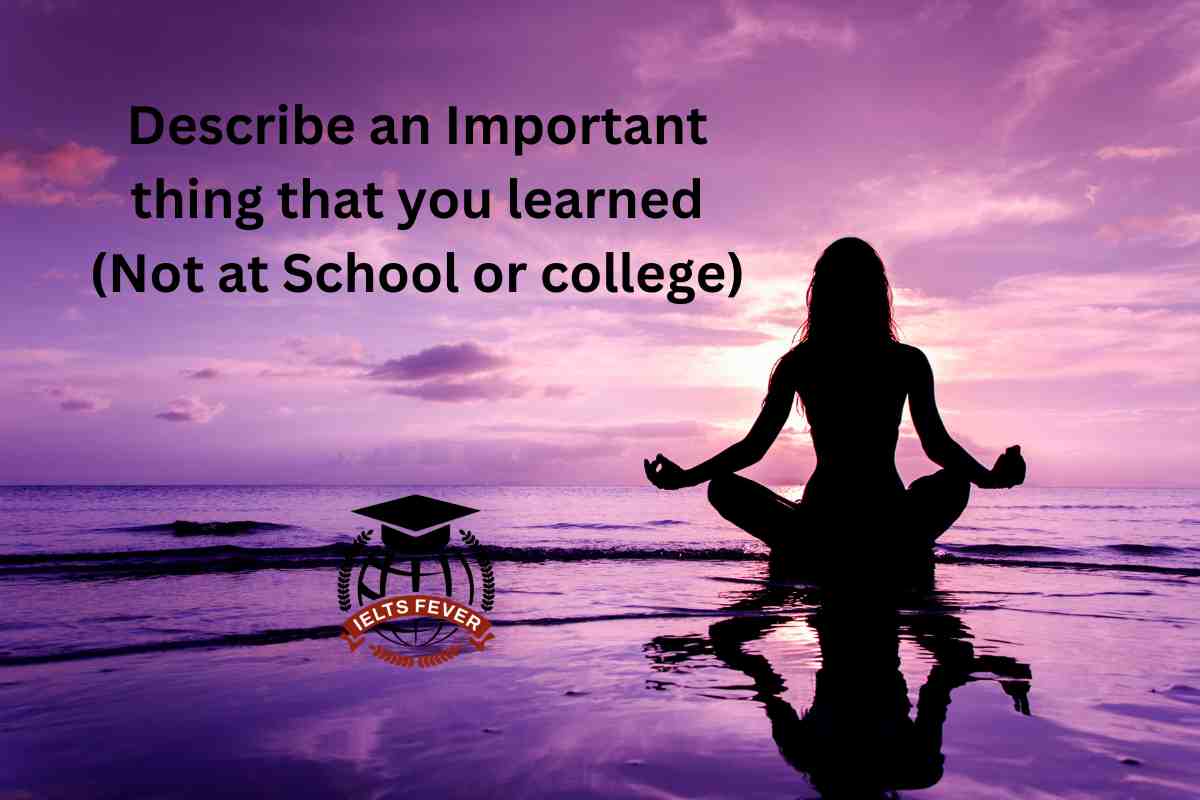Describe an Important thing that you learned (Not at School or college). You should say:
- When did you learn it?
- How did you learn it?
- Why did you think it was important to learn it?
- How did you feel when you learnt it?
Sample 1 Describe an Important thing that you learned (Not at School or college)
One of the most important things I learned recently was about the power of mindfulness and meditation. I learned about it a year ago through a friend who is a mindfulness coach.
I learned about mindfulness and meditation because I struggled with stress and anxiety and was looking for ways to cope with these feelings. My friend explained the benefits of mindfulness, such as increased focus, reduced stress and anxiety, and a greater sense of inner peace and happiness.
Initially, I was sceptical, but I decided to try it and started incorporating mindfulness into my daily routine. I started with simple breathing exercises and gradually built up to longer meditation sessions. I also started noticing my thoughts and feelings and learned to observe them without judgment.
I began to feel calmer and more centred as I continued my mindfulness practice. My stress levels decreased, and I found that I was better able to handle difficult situations. I also felt more connected to my inner self and had greater inner peace and happiness.
Learning about mindfulness and meditation was a significant turning point in my life. It helped me better manage my stress and anxiety and has positively impacted many areas of my life. I feel grateful for having learned about this powerful tool and for incorporating it into my daily routine.
In conclusion, learning about mindfulness and meditation has been an incredibly enriching and transformative experience for me. This practice has the potential to help many people, and I would highly recommend it to anyone looking to improve their mental and emotional well-being.
Sample 2 Describe an Important thing that you learned (Not at School or college)
One of the most important things I recently learned was about self-care. I learned about this a few months ago by reading books and articles and attending workshops.
I learned about the importance of self-care because I felt overwhelmed and stressed due to my busy schedule and demanding responsibilities. I realized that I was neglecting my own needs and well-being, negatively impacting my overall health and happiness.
I was fascinated by the idea that taking care of ourselves is not a luxury but a necessity. I learned that self-care encompasses many different aspects of our lives, including physical, emotional, and mental health, as well as our relationships, finances, and career.
I felt empowered when I learned about the different ways I could take care of myself, such as practising mindfulness and meditation, engaging in physical exercise, getting enough sleep, and pursuing hobbies and interests. I also learned the importance of setting boundaries and prioritizing my needs and well-being.
I started incorporating self-care into my daily routine and saw a significant improvement in my overall health and happiness. I felt more energized and better equipped to handle the demands of my life.
In conclusion, learning about the importance of self-care has been a life-changing experience for me. Self-care is essential for maintaining good physical, emotional, and mental health and achieving overall happiness and well-being. I encourage everyone to make self-care a priority in their lives.
Follow-Up Questions Describe an Important thing that you learned (Not at School or college)
Question 1:- What do children learn from their parents?
Children learn many important lessons and values from their parents. They learn about love, empathy, responsibility, and ethics. They also learn how to interact with others, handle emotions, and solve problems. Children develop their personalities, beliefs, and habits that shape their adult identity through observing and imitating their parents.
Question 2:- Are some children well-behaved because of their parents?
Yes, some children are well-behaved because of their parents. Parents play a crucial role in shaping their children’s behaviour and character through setting expectations, providing guidance, and modelling positive behaviour. Children with consistent, supportive, and loving parents tend to have better self-esteem, confidence, and social skills, which can contribute to their well-being and good behaviour. However, it’s important to note that other factors, such as peer influence, personality, and environment, also play a role in a child’s behaviour.
Question 3:- Is it necessary for adults to learn new things?
Yes, adults must continue learning new things. Keeping the mind active and engaged helps maintain cognitive function and provides a sense of purpose and fulfilment. Learning new skills or knowledge can also help individuals stay relevant in the workplace and enhance their career prospects. In addition, learning can be a source of personal growth and profit and increase self-confidence and self-esteem. Continuously learning allows adults to stay curious and open-minded, leading to a more fulfilling and enriched life.
Question 4:- What are the options for learning new things?
There are many options for learning new things. Adults can take traditional classroom courses, enrol online, attend workshops or seminars, read books or articles, watch educational videos, or seek mentorship or coaching. Some people also prefer to learn through hands-on experiences, such as volunteering, travelling, or starting a new hobby. The options for learning are virtually limitless and can be tailored to an individual’s interests, goals, and schedule.
Question 5:- Is learning new things necessary for physical and mental health?
Yes, learning new things can positively impact both physical and mental health. It helps to challenge the brain and prevent cognitive decline, leading to better memory and problem-solving skills. In addition, learning can reduce stress, increase self-esteem, and improve overall mood and well-being. Engaging in new activities and learning new skills can also lead to increased physical activity, which can positively impact cardiovascular and overall physical health. By keeping the mind and body active, learning new things can help to maintain and improve overall health and well-being.

